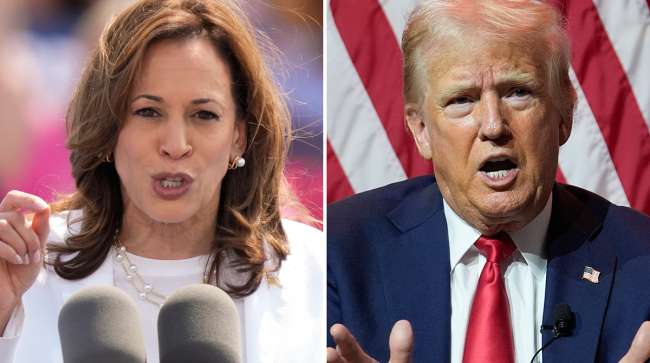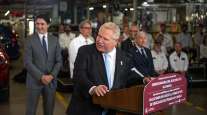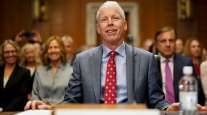Senior Reporter
Harris, Trump Pledge Economic Progress

[Stay on top of transportation news: Get TTNews in your inbox.]
With Election Day fast approaching, the two major candidates for president are both promising voters quality-of-life improvements made possible by divergent economic plans.
The objective of lower inflation is a shared goal, yet the campaigns of Vice President Kamala Harris and former President Donald Trump are presenting voters with distinctly different plans with simplified specifics.
The Harris campaign has said it intends to incentivize business startups by facilitating access to tax benefits. The aim, as stated on the campaign’s website, is to “drive venture capital to the talent that exists all across our country including in rural areas, and increase the share of federal contract dollars going to small businesses.”
“My plan is about saying that when you invest in small businesses, you invest in the middle class, and you strengthen America’s economy. Small businesses are part of the backbone of America’s economy,” Harris recently told “60 Minutes.”
Over the last three and a half years, we have brought manufacturing back to America, creating 730,000 manufacturing jobs.
As president, this will be a priority for my administration. We cannot have a strong middle class without American manufacturing. pic.twitter.com/Bk6nFlrJeL — Kamala Harris (@KamalaHarris) October 9, 2024
Harris also is pledging to prioritize funds for social programs specific to food and housing assistance, and has promised to assist would-be first-time home buyers while taking aim at the rising costs for goods and services nationwide.
During a Sept. 10 debate with Trump, the vice president said, “We know that we have a shortage of homes and housing, and the cost of housing is too expensive for far too many people. We know that young families need support to raise their children.” She also has pledged to preserve her current administration’s commitment to provide billions of dollars for infrastructure construction projects as well as domestic equipment manufacturing.
The Biden-Harris administration is managing the implementation of the Infrastructure Investment and Jobs Act and the Inflation Reduction Act, a pair of legislative measures that dedicate billions of dollars to domestic infrastructure — including roads and bridges — in addition to the construction and manufacturing sectors.
Trump is pledging to significantly reduce inflation and ease economic pressure via lower interest rates. “We commit to reducing housing, education, and health care costs, while lowering everyday expenses, and increasing opportunities,” the campaign has said. “Republicans will reduce the regulatory burden, lower energy costs, and promote economic policies that drive down the cost of living and prices for everyday goods and services,” according to the campaign’s “2024 GOP Platform: Make America Great Again!”
Trump has also proposed doubling the amount of equipment investment small businesses can deduct to $1 million from $500,000, according to a Bloomberg report. This measure aims to help small businesses afford work vehicles, potentially stimulating the commercial vehicle market.
https://t.co/hkmTSuRhQi pic.twitter.com/8sWO8CStyQ — Donald J. Trump (@realDonaldTrump) September 26, 2024
The former president explained during the debate with Harris, “Everybody knows what I’m going to do. Cut taxes very substantially. And create a great economy like I did before. We had the greatest economy.”
Karoline Leavitt, the campaign’s national press secretary, emphasized, “If Kamala is given another four years, our economy will nosedive into the worst depression this country has ever seen. Americans will continue to be robbed of their paychecks with astronomical inflation and higher taxes.”
“There is only one solution to fix our economy: re-electing President Trump,” Leavitt said on the campaign’s website Oct. 10. “He’s a businessman with a proven track record of success and will turn Kamala’s worsening economy around on day one.” As president, Trump enacted a law specific to individual income and estate tax provisions.
According to a recent Gallup poll, registered voters surveyed ranked the economy as the top issue that will influence their vote for president in November. Among 22 issues, a majority of respondents said the economy is an “extremely important” factor in this election. The registered voters by 54% to 45% indicated Trump would “better handle” the economy over Harris.
Want more news? Listen to today's daily briefing above or go here for more info
“Economic confidence in the U.S. has been persistently low this year, which is reflected in U.S. voters rating the economy as the most important issue impacting their choice for president,” according to Gallup. “While the economy often ranks as one of the top voting issues in presidential elections, this year it may be more influential than in any election since 2008 during the Great Recession. Trump is favored over Harris to better handle the issue, giving him a significant advantage in the election, though this is partly influenced by Republicans being more likely than Democrats to rate the economy as an extremely important issue.”




